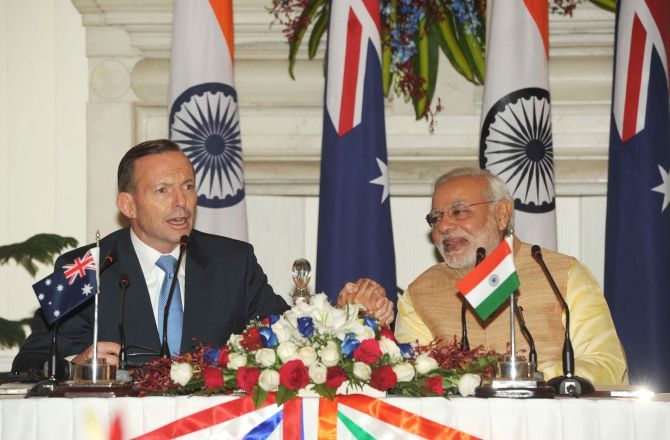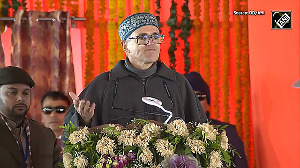
Taking their bilateral ties to new heights, India and Australia on Friday inked a landmark civil nuclear deal that will pave way for Canberra to supply uranium to the energy-starved country even as the two sides decided to step up cooperation in defence, security and trade.
The nuclear pact was signed following a meeting between Prime Minister Narendra Modi and his Australian counterpart Tony Abbott during which the two leaders deliberated on crucial bilateral, regional and international issues including the situation in Iraq, Afghanistan and Ukraine.
Welcoming signing of the agreement, Modi said it was a "historic milestone" in bilateral relationship.
"It is a reflection of a new level of mutual trust and confidence in our relationship and will open a new chapter in our bilateral cooperation. It will support India's efforts to fuel its growth with clean energy and minimise the carbon footprint of its growth," he said at a joint press briefing with Abbott.
Australia has about a third of the world's recoverable uranium resources and exports nearly 7,000 tonnes of it a year. India and Australia had launched talks on uranium sales in 2012 after Canberra lifted a long-time ban on exporting the valuable yellow cake to Delhi to meet its ambitious nuclear energy programme.
Aimed at promoting cooperation in the field peaceful uses of nuclear energy, the agreement recognises India's commitment to and use of nuclear energy with a view to achieving sustainable development and strengthening energy security.
"Australia can play the role of a long-term reliable supply of uranium to India. It provides for supply of uranium, production of radio isotopes, nuclear safety and other areas of cooperation," as per the pact details.
The pact is significant given that Indian nuclear plants generate around 4680 MW of electricity, of which the 2840 MW was from indigenous uranium while 1840 MW was from imported fuel.
On his part, Abbott termed the day as "remarkable" for him as well as for Indo-Aus ties and said Australia "trusts India to do the right thing (in the nuclear area) as it has been doing in other areas" and his country was happy to help in meeting energy demand of 1.2 billion-strong India.
The two prime ministers directed the negotiators to conclude the administrative arrangements pertaining to the civil nuclear pact at an early date. According to officials, it may take up to two years for India to receive the first consignment of uranium from Australia.
The civil nuclear deal is among the four pacts signed -- Cooperation in Technical Vocational Education and Training as also in Water Resources Management and sports.
Noting that India wishes to deepen its relations further with Australia, Modi said, "Australia can make a very important contribution to India's development. India is a resource-constrained country and can meet a considerable part of its requirements from Australia, a country blessed with abundant natural resources."
"There are enormous possibilities in the area of manufacturing and infrastructure. In the coming years, India can emerge as a major source of highly skilled human resources," he said, adding that Abbott has assured him of speedy clearances for the Indian companies wish to invest in Australia.
India and Australia must not only work together with a sense of priority to promote peace and prosperity in Asia, Pacific and Indian Ocean Region, but also take on the responsibility of bringing together all other countries in this endeavour, Modi said, adding "We will also increase our security cooperation to counter terrorism, cyber threats and other security challenges."
India will also join in the commemoration of 100 years of the World War one, in which soldiers of the two country fought together, he said.
Noting that there has not been any prime ministerial visit from India since 1986, Modi said, "I have accepted Prime Minister Abbott's invitation to pay a bilateral visit to Australia after the G20 Summit. We will try and meet each other at every available opportunity...”
"We will also increase our consultation and coordination in important forums like the Indian Ocean Region Association and East Asia Summit."
Modi also noted that the two countries will hold their first bilateral naval exercise in 2015 and said they intend to enhance the exercises in the coming years.
He also talked about fresh funding for the Australia India Strategic Research Fund, which supports research activities in areas like clean energy, water, health, environment and food processing.
Abbott, who is on a two-day visit, landed in Mumbai early on Thursday where he held extensive meetings with business leaders and select Indian CEOs.
Noting that India and Australia were bound by "strongly convergent" trade and strategic interests, the visiting dignitary has said, "We do need to invest more time and effort into the trade and investment relationship with India."
The two-way trade was worth around 15 billion dollars but the aim was to substantially grow this figure, the Australian leader said.
He also maintained that India has proved that economic transformation is quite compatible with robust free speech, independent courts, and democratic checks and balances on government.
"The election of new governments opens new possibilities for both our countries. Australia is 'open for business' -- Prime Minister Modi is inviting the world to, 'come, make in India'," he said.
After being accorded a ceremonial reception at Rashtrapati Bhavan on Friday morning, Abbott laid wreaths at Rajghat and India Gate before meeting Modi at Hyderabad House in the evening.







 © 2025
© 2025